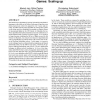108 search results - page 11 / 22 » Improve a Game Board based on Cultural Algorithms |
141
click to vote
ATAL
2011
Springer
14 years 1 months ago
2011
Springer
The fastest known algorithm for solving General Bayesian Stackelberg games with a finite set of follower (adversary) types have seen direct practical use at the LAX airport for o...
103
click to vote
ISM
2005
IEEE
15 years 7 months ago
2005
IEEE
Hazard detection and prevention of natural and manmade disasters at critical civil infrastructure is becoming increasingly important. Recent events, such as earthquakes and terror...
80
Voted
CAV
2007
Springer
15 years 7 months ago
2007
Springer
In 2005 we proposed the first efficient on-the-fly algorithm for solving games based on timed game automata with respect to reachability and safety properties. The first prototy...
131
click to vote
SMC
2010
IEEE
14 years 11 months ago
2010
IEEE
The handshake gesture is an important part of the social etiquette in many cultures. It lies at the core of many human interactions, either in formal or informal settings: exchangi...
AIIDE
2008
15 years 3 months ago
2008
We introduce the ALeRT (Action-dependent Learning Rates with Trends) algorithm that makes two modifications to the learning rate and one change to the exploration rate of traditio...

